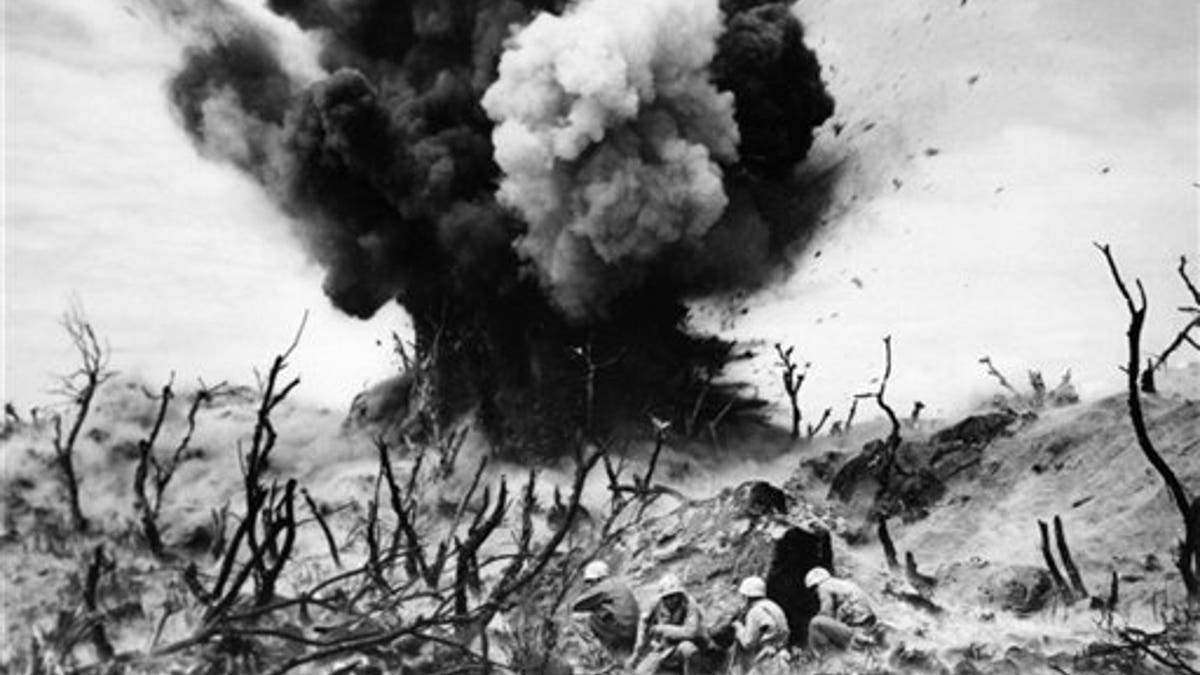
(AP )
The upcoming 70th anniversary of V-J Day, August 14, brings to mind the challenge my father, Lt. Col. Wilber E. Bradt, faced in the days preceding that date in 1945.
He was the acting commander -- and later the commander -- of the 172nd Infantry Regiment, a Vermont National Guard unit. The unit had just finished five months of combat subduing the Japanese on Luzon, in the Philippines. On July 28, the 43rd Infantry Division, of which the 172nd Infantry was a part, received alert plans for the invasion of Kyushu, the southernmost island of the Japanese homeland. The landings would take place on November 1, a scant three months away. An intense period of planning, training, re-equipping, and personnel transfers began.
The 43rd Division was to land with two other divisions in Shibushi Bay on the southeastern coast of Kyushu. The 43rd would land on the southern end of the beach, which was overlooked by hills rising to 2,700 feet that would be permeated with Japanese defenses. My dad wrote that he knew “which hills [his regiment] was to take and what some of the difficulties were,” and that “My regiment was given the point considered most critical to the success of the division action. That meant we couldn't take our time but would have to drive thru anything we met the costly way.”
Poignantly, he also wrote, “there would have been many casualties. In fact, I didn't expect to come thru that one alive.”
But with the dropping of two atomic bombs on Japanese cities on August 6 and 9 and the entry of the Russians into the war against Japan on August 9, Japan capitulated. It accepted the Allies’ demand of an unconditional surrender with the proviso that the emperor be retained. He and the entire Japanese government would be subject to a supreme allied commander, Gen. Douglas MacArthur.
When news of the Japanese acceptance reached the American public, there was wild rejoicing in the streets and elsewhere, but many reacted in a quieter fashion. My dad wrote, “The 43rd didn't do any noisy celebrating. No promiscuous firing, no one hurt and no regrets. I was proud after reading the news of the hysteria elsewhere … One soldier said, ‘So it's over. Well! I think I'll go sit under that tree,’ and [that was] a rather typical reaction.”
As the son, I have long been intrigued by the plans for the invasion of Japan and the likelihood of its success. The Allies planned to occupy the southern part of Kyushu and use it as a base for an invasion of the Tokyo plains four months later. The prospects were grim. The Japanese had surmised that the first landings would take place on Kyushu and had succeeded in reinforcing it with additional regiments. Thousands of Japanese suicide planes (kamikazes) were available to attack the troop transports; American casualties during the landings could have been horrific.
In the Luzon invasion the previous January, the Japanese kamikazes had attacked the bombardment fleet in Lingayen Gulf with dismaying success. When the troop transports arrived three days later, the Japanese had expended most of their kamikaze fleet, and the landings were largely unopposed from the air. The Japanese were not about to make that mistake again! Furthermore on Iwo Jima, the Japanese had perfected a dug-in defensive strategy that maximized their opponents’ losses. The operation promised to be a bloodbath. Indeed, the high casualty estimates were an important element in President Truman’s decision to use the atomic bomb.
It is thus more than likely that my dad would not have survived the invasion. He had a penchant for being out front where officers of his rank (Lt. Col.) were not expected to be. He had been wounded twice in the Solomon Islands and had earned the Silver Star -- a medal for personal bravery -- three times during the Luzon campaign. Was it the atomic bomb that saved him from a likely death on Kyushu? Perhaps, but the Soviet declaration of war played an essential role—perhaps more so than the two atomic bombs -- in convincing Japan’s leaders that they had to capitulate.
Perhaps the bombs were required to bring about Japan’s defeat without a massive loss of American and Japanese lives, but perhaps they were not. We will never know for sure.
At the war’s end, my dad returned home to Washington, D.C., after three full years in the Pacific theater. Six weeks later, on Dec. 1, 1945, he took his own life with his personal .45 Colt pistol. He was 45 years old and I was one week shy of my 15th birthday.
